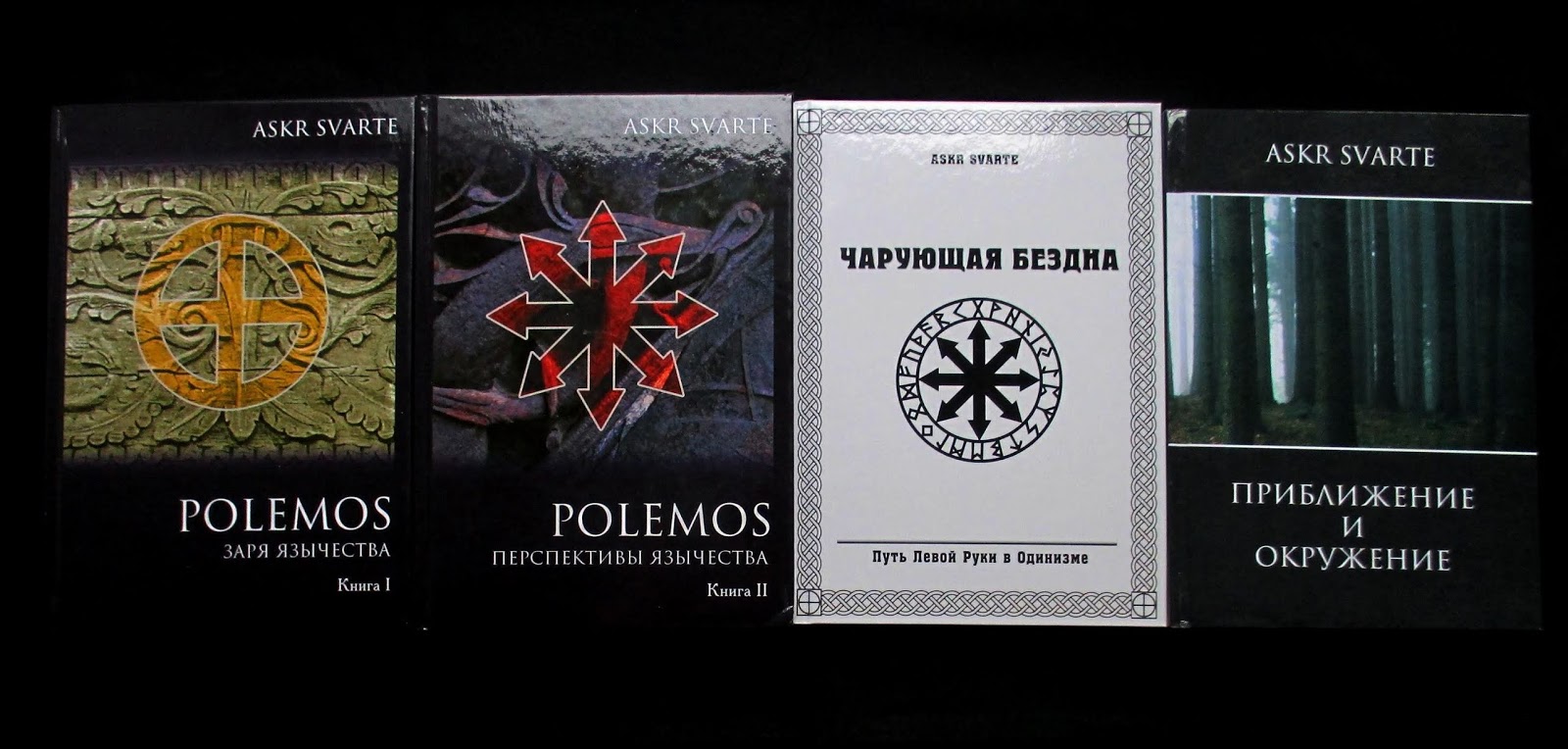Interview for slovenian blog “Tradition against the tyranny”
For the beginning please tell us how and when did you first became interested in the old faith, and what led you towards the path of paganism?
Greetings!
Last 2019 marked ten years since I first stepped onto the pagan path. Once upon a time in my youth, the books of Alexei Dobrovolsky (Dobroslav) and Varg Vikernes fell into my hands. This served as an impetus for my immersion into pagan traditions. Prior to this, I had actively studied classical European occultism. Now my views have gone much further and deeper. For example, I realized that Varg has revealed himself to be a pagan only in his music, not in his ideas and books.
In addition, I have direct German roots. My ancestors were German immigrants to the Russian Empire and were later exiled to Siberia. German blood predetermined my path precisely in line with the German-Scandinavian tradition. But I regard Slavic paganism as a friend and ally, largely because for many years I have been friends with Veleslav Cherkasov (volhv Veleslav). And I`m well acquainted with his philosophy and books. His teachings on the Sacred and the inner true nature of man can be traced in my works.
In principle, it is absolutely true that paganism is a natural and authentic form of religiosity and spirituality for all peoples (ethnoi) living in this world.
You have authored several books on the topic of paganism and the old faith. Could you briefly introduce those books, as well as your other activities, to our readers, and also explain to us the main essence of the worldview that you call “Traditional Paganism”?
My works can be divided into two lines: my books on the Germanic-Scandinavian tradition on the one hand, and my books and articles on pagan philosophy, theology and criticism on the other one. In my opinion, the second direction touches upon the general topics and problems which face Indo-European traditions, especially in Europe. I develop my tradition and at the same time propose solutions or formulate questions that concern us all. This is work for the common good.
I have published two books about the Germanic tradition: “Gap: at the Left Hand of Odin” (Fall of Man Press) and “Приближение и окружение” (“Forthcoming and encirclement” Svarte Publishing). In them I consider and develop the direction called the “Left Hand Path” — the transgressive, traumatic experience of the Sacred and the existence of Tradition in the era of Ragnarok, the absolutely unfavorable modern age. In the second book I hedge a big bet on the philosophy of language and Martin Heidegger, which is very rare in our circles.
If we talk about paganism in general, then in Russian I published a big work “Polemos: Pagan Traditionalism”, in the amount of 800 pages in two volumes. In it I consider the history and current state of many Indo-European pagan traditions. I study and show with a huge number of examples how Modernity and Postmodernity have infiltrated paganism and gradually destroyed a variety of cultures and religions. I touch upon the most pressing issues, including virtual reality, technology and the industrial society, feminism, politics, language, etc. But besides criticism, I tried to show the positive aspects, the successes of paganism, as well as new directions of thought and mystical revelations related to Traditionalism. Some information about the book in English is available at www.polemos.ru
I have also already published more than a hundred articles on paganism and dozens of interviews with various pagan figures, writers and activists from Russia, Europe and America. We publish them in our almanac “Warha”. This fall will be the seventh edition in Russian, and in 2019, the second edition in English called “Warha Europe” was released. It is posted online for free. In addition, for the second year already we have been running our own media platform about paganism, the “Foundation of Traditional Religions” (www.tradition.foundation), which is well known among Russian scholars of modern paganism.
The worldview of Traditional Paganism is also connected with the Traditionalism of Julius Evola. Now, in general people use the term “traditionalism” in connection with respecting ones local and national traditions and customs, but the Traditionalism of Evola, or of Rene Guenon, is in fact a philosophy that believes in the cyclic nature of history in which the different ages, form the golden age to the dark age, are reoccurring through time, and it also believes that there are transcendental truths on which traditions of all ancient religions rests. Could you please tell us a bit about this philosophical current, and to which extend it is present within “Pagan Traditionalism”? Also tell us a bit about Evolian concepts such as “Revolt against The Modern World” and “Ride the Tiger”, which are also titles of two of his more important books. What would the “Modern World” represent in Evolian sense, and how can we best revolt against it in the current time of Kali Yuga, or Dark Age?
This is exactly what I write about in “Polemos”. The Traditionalism of Julius Evola, Mircea Eliade and Alain de Benoist lies at the heart of my method and views. Yes, Pagan Traditionalism emphasizes two things: a) locality (“Reject the global, respect the local”) and the uniqueness of each pagan tradition and its people’s culture; b) the unity of all Indo-European traditions at the highest level of theology, in the apophatic core of the Sacred. There is another metaphor: the One Tradition is the basic grammar of the language of the Sacred, while the individual traditions of different peoples are myths (literally “myth” means “story”), the stories and communication of peoples with their Gods. This approach removes contradictions and does not call for the creation of any one single pagan church or religion, it does not create the prerequisites for unification. Unity in plurality, complexity in plurality. This is the plurality of cultures versus only one culture or the multiculturalism (left-liberal diversity) of the melting pot.
Regarding the Evolian call to “Revolt Against the Modern World”, Evola himself speaks best of all about it. To summarize, the Modern World (since the XV-XVI centuries) is an inverted reflection of the world of Tradition. Everything that was sacred and constituted the structure of traditional societies was destroyed and turned inside out. Instead of the sacred, there is the profane, instead of the aristocracy — egalitarian citizenship, instead of peoples and clans — nations, instead of religion — science, instead of estates and castes — equality, etc. But the problem runs even deeper: instead of traditional thinking and language, we got modern logic, methods and algorithms of thought, Cartesianism and Hegelianism. Following Rene Guenon, Evola proposed to rebel against all of this and regain aristocratic dignity and the highest sacred landmarks of life.
But in his late work “Ride the Tiger”, Evola offered a reflection on his path over many years and attempts to restore the Tradition. Evola admits that a different strategy is needed. Not a simple war for the sake of restoration, but cunning, patience and waiting. Hence the well-known image of “riding the tiger”: to preserve the existential tension and fidelity (semper fidelis) of the Tradition and higher ideals even in the era of total alienation and decline. “If Europe was the first to enter decline, then its destiny is to be the first to come out of it”, Evola says. Among the minuses of this work I would like to point out the misunderstanding of Heidegger’s ideas. Although researchers say that Heidegger was familiar with the writings of Evola.
Unfortunately or fortunately, we do not have a ready-made universal formula for “how we can turn everything back”. There are various options. In my personal opinion, one of the conditions of the Kali Yuga is the impossibility of large initiatic communities. Fate unfolds in small (several thousand is also a small) groups or on an individual level. The way by which it will be possible to totally erase the Modern world from the face of the earth is still hidden from us. I also think that a proper death (leaving this world) can give worthy fruits useful for the further journey of the soul and become a spark that can remind others of the flame of Tradition.
What other thinkers, philosophers and writers have also influenced you?
As I said before: Julius Evola, Mircea Eliade, Veleslav Cherkasov and Alain de Benoist. It is necessary to add to this list Alexander Dugin, almost all of whose works I know well. Nevertheless, I must issue the reservation that our views on some key and particular issues are diametrically opposed. It is also necessary to mention Martin Heidegger, who in himself is a riddle of riddles. Heidegger’s philosophy is a challenge that formulates even deeper and more radical questions than Traditionalism. Building a bridge between Traditionalism and Heidegger is a daunting task. Here it is more important to pose the question correctly than to answer it.
I can also name other authors in random order: Meister Eckhart, Ernst and Friedrich Georg Jünger, Jean Baudrillard, Kaarlo Pentti Linkola, Collin Cleary, the poetry and personal myth of Evgeny Golovin, the poetry of Sergey Yesenin. But that is not all.
It seems that Paganism is quite connected with different views found on the Right, for example with the New Right school of thought, whose main philosopher Alain de Benoist has also written extensively on Paganism. What would you say are the main concepts, views and ideas that can be found in pagan belief and in ancient religions that are also attractive to the New Right and also to many different people on the right, from identitarians to ethnonationalists?
This is largely due to the activities of Alain de Benoist. But if we look at history then the interest of nationally-oriented thinkers in the traditions of their own people and in the soil (folklore) can be traced back several centuries. The advantage of de Benoist’s ideas is that he overcame an orientation towards strict nationalism, which in fact is the purest manifestation of Modernity. He relied on culture, on ethnicity, on the rejection of globalization, and bet on the study of European cultures and history. For him, paganism is a way of thinking within the framework of which one can build such a view and practice that will allow for avoiding the errors of Modernity, the errors of the Enlightenment. For Alain de Benoist and all successive New Rights and Identitarians, the roots of Enlightenment, egalitarianism and globalization go back to Christianity, which lays down the basic premises which in turn flourish in later times as Modernity. The main thing here is that this is not only de Benoist’s authorial position. These ideas are generally common to many authors and are true as such.
Another well-known figure within the New Right movement is Russian author Aleksandr Dugin. What is your opinion about his 4th political theory and about Eurasian movement?
As I already noted, I am very familiar with the ideas of Alexander Dugin. By the way, even in his books (for example “Post-Philosophy”), Dugin recognizes that Christianity is a step towards decline and Modernity.
Eurasianism is a foreign policy project and ideology. Inside Russia we are witnessing complete failure in all directions. A Western audience may think that Russia is a bastion of conservatism and religion, but this is the work of foreign policy propaganda and television. We have an oligarchic country where conservatism is simulated to console people and gain electoral loyalty.
The Fourth Political Theory is a very tempting concept which contains precise definitions of previous formations and proposals on “how everything should NOT be”. In general, the concept develops the same provisions of de Benoist and Traditionalism, with the influence of Heidegger and an even tougher overcoming of Modernity. Depending on the point of view, 4PT has pluses and minuses, such as the lack of practical implementations, specific roadmaps, positive descriptions. It seems to me that this was the plan: to give thinkers and politicians a field in which there are basic rules and intentions; but the specific embodiments of 4PT can be very different in different parts of the Earth. Finally, this theory is still under development and in order to gain a better understanding of its “mechanics”, one should study it and try to propose solutions on the basis of their own culture and the (geo)politics of their country.
While the modern man will discard ancient myths as some primitive fairy tales, many believe that myths are much more that that; that the mythical creatures, heroes and gods represent different archetypes, and that myths themselves in fact represents much more than some stories of our ancestors. Tell us what your views about the ancient myths are, what can we learn from them and why is it important that every nation remembers and nourishes its myths and legends?
Firstly, any claim that modern science and society have overcome mythology is false in itself. Now myths exist as degenerative fragments and reflections of stereotypes, political and marketing myths created for specific purposes. This was written about by Jean Baudrillard and Roland Barthes. Despite all the pathos of rationality, societies are still deeply irrational in their social dynamics.
A Myth is a story, a narrative. I believe that Myth is both a paradigm and in a sense an episteme, a special way, logic and procedure of thinking that surpasses the classical Cartesianism and Aristotelian logic that we are taught in schools. Collin Cleary has a good definition of such a mode of being: to be open to Being and the positive will of poetic creation.
To dwell in Myth (the myths of the culture of your people) — this means in general to change your thinking, your view of the world and way of being. What can we learn from Myth? Everything. Myth is our Homeland.
Even though materialism has prevailed in Europe and in the West, leaving little space for real spirituality, it seems that people are left wanting for any kind of myths or mythologies. This can be seen through ongoing popularity of movies and books with mythical themes, like for instance the legendary books of J.R.R. Tolkien, which are as popular today as they were when they were written almost 70 years ago. What do you think is behind the fact that even in the world where everything is rationalized, people are still craving for such mythical tales? Would you agree that in some extent on subconscious level people want to return to the world of myths and traditions, because the modern utilitarian liberal views cannot satisfy their spiritual needs?
In my opinion, everything is driven by the thirst of producers to make profit. Therefore, I have no illusions that any film or series can at least help in the promotion of tradition. This should be understood as an axiom: everything related to media and TV is degrading. Anyone who tells you that “Vikings” is popularizing the Germanic-Scandinavian tradition is at best just a foolish person. Popularity here is dictated by special effects and fashion cycles on certain topics in culture. A couple of years will pass and everyone will be sick of fantasy and fairy tales, people will watch another trendy genre.
Regarding Tolkien, Martin or Gaiman and the literature of such genre as a whole, I believe that all this is a simulacrum, fake and a compilation based on real myths and traditions. If readers want “something epic” or “fabulous”, then let them go and read the sagas themselves, the real stories or sacred texts. Or better — let them embody these principles in their life.
You are right when you say that modern utilitarian liberal views are not able to satisfy spiritual needs. People experience a deep nostalgia for authenticity for which they do not know where to look. And then a chimera is born when under the guise of spirituality the System feeds people pseudo-spirituality, under the sauce of entertaining content too. People are weak and blind, so they take a fake for something real and for them “returning to myth” means “watching the next season”. These people are lost.
Besides the already mentioned Pagan Traditionalism, you are also the follower of the “Left Hand Path”. Could you explain the meaning this term has in spirituality and tell us a bit about it?
The term “Left Hand Path” is a generic name for a large number of schools and teachings, traditional and modern. Some of them are even opposed to each other, so I will talk about my view of things.
In my opinion, the Left Hand Path is that approach or that configuration within Tradition that corresponds to the changed metaphysical conditions of our era. Roughly speaking, it is impossible in the era of the Iron Age to practice tradition as if the Golden Age is around us. Therefore, the Left Hand Path as a whole suggests approaching the problem differently, from a different angle. There is no question of restoring the Golden Age or returning to the comfortable world of bourgeois conservatism, as almost 100% of European conservatives see such as the ideal — the bourgeois conservatism of the XVIII-XIX centuries.
We must rely on a transgressive and radical experience of adverse metaphysical conditions as manifestations of the proper order of things. Hence the increased attention to the grim aesthetics and images associated with death, destruction and ecstatic (shamanistic) practices. But this is the external level. Deeper again, everything rests on the problem of thinking and the correct interpretation of the metaphysics of time and our true inner nature. The Left Hand Path is almost always an individual path of spiritual self-knowledge and overcoming duality (akin to Tantric Advaita). It could be said that the Left Hand Path is the most favorable path of spiritual realization in the most unfavorable era for Tradition, framed by horror, which scares away those who are not ready yet or who do not need such a path at all. I agree with this view, according to which the era of destruction, parodies and simulations is under the patronage of the Gods responsible for death, journeys and changes of appearance and states of mind (for example Dionysus and Wotan). The question is what type of sacrifice we need to perform in their honor and how to do so correctly.
Regarding the fact that Russia is a traditionally Slavic country, how come that you have decided for the path of Germanic Odinism, instead of the Slavonic “Rodnovery”, especially considering that European ancient religions are also what we could call “ethnic religions”? Are the reasons for this connected in any way with the Scandinavian roots of Russia?
As I said at the beginning, I have a lot of Germanic ancestors on both parent lines. My relatives live in Swabia and Bavaria, so the solution to this issue was correct. I`m in friendship with Rodnovers and other Slavic (and not only) pagans, they are my associates.
While, as I have mentioned above, the ancient religions of Europe, are in a sense ethnic religions, they all share the same roots which go back to Vedic beliefs and to the Indoeuropeans, which are also the source of most of the European languages and nations. We can easily notice this connection by comparing different deities of different European peoples. Can you tell us a bit more about this connections, maybe give us a few examples of similar beliefs and deities across Europe, and specially present to us the similarities between Germanic and Slavic beliefs, gods, myths and customs?
Regarding general kinship, then everything on this matter has been perfectly described by Georges Dumézil (see his book “Les Dieux indo-européens”) and academic linguistics. There are many examples, whether in the triadic structure of the supreme Gods among the Indo-European peoples or similar terms for the concept of “God” in different languages.
In Russian, the word “бог” is commonly used to refer to sacred heavenly figures. It goes back to the Proto-Slavic *bogъ and, according to M. Fasmer, to the pre-Indo-European root *bhag (hindu bhágas), which means “to endow”, “to give” and “to divide”. Etymologically, God is a “giver”, “He who brings gifts”, for example Даждьбог (Dazhdbog) in Slavic mythology.
In the Germanic languages, the use of the word Gott was fixed, in English — God, in Old Norse — Goð/Guð. The word itself goes back to the proto-Germanic *guda(n) (God), to the pre-Indo-European root *ǵhuto derived from *ǵhew, meaning “to spill” or from *ǵhaw, meaning “to invoke”.
Everywhere the meanings are in one semantic nest: the giver, the divider and at the same time the one who dwells in heaven. The Gods are those who grant something from heaven or share something with everyone.
Science proposes to think about the hypothesis of a single proto-language, which was once spoken by a single proto-folk, from which all the Indo-European peoples developed and settled over millennia. This question takes us back to indescribable depths of centuries, where scientists can only put forward hypotheses and pose unanswered questions.
By the way, I’m not a supporter of the radical version of cultural circles, according to which things, words and objects are invented only once in history, and then spread from people to people. This is ridiculous and excludes the possibility of simple coincidences or identical decisions among different nations that have never met each other. And this approach imposes on us the idea that there are peoples who are carriers of progress and inventions and there are peoples who only take over the discoveries of others. This is some kind of cultural racism on the archaeological level. Our common kinship at the level of distant ancestors should not exclude our unique identities and various solutions to the same problem, depending on the differences between cultures or environments. Finally, more important to me is our “kinship” in the Sacred, in the transcendental dimension. This relationship is not in the past, but here and now.
The only text which was allegedly written by the pre-Christian Slavs themselves, and not by the Christian missionaries, concerning their beliefs, is The Book of Veles, which was written on wooden planks. This text, which was found in Russia in early 20th century, has been mostly regarded as a forgery by most of the official scholars. What is your opinion about this text and what status does it have among the Russian Rodnovers?
The “Book of Veles” is a fake and this is an absolutely reliable fact. No one has ever seen any of the tablets, while linguistic and cultural analysis of the text suggests that it is purely modern in origin. In my opinion, the most convincing version is that such was Mirolyubov’s attempt to rewrite Indian myths in the language of Russian folklore. This is very much in the spirit of his era, marked by passion for Eastern spirituality, etc. Some of the ideas that he proposed in his work have found a response among Rodnovers, such as the tripartite division of the world, the image of Veles. These fragments of his work are very close to Indo-European and archaic structures. But in general it is a fake and cannot be considered as a reliable source. Among Russian Rodnovers this is a kind of marker of adequacy.
When Christianity started spreading through Europe it took over many old customs, legends and practices in order to establish itself as the dominant new religion. Can you give us some examples of this in Russia and also tell us how do you view Christianity as opposed to Paganism?
What you are talking about is called “dual faith”, which they are now actively trying to present as “folk Orthodoxy”. In fact, the situation is quite complicated. Of course, when Christianity came to establish its power, whether it was forced to or not it nevertheless acquired and absorbed many elements of pagan culture and the calendar. An example is the tradition of Kaledari — a winter procession of mummers from home to home. In paganism, these were spirits that collected gifts (almost in the spirit of Bataille and Moss) and in Orthodoxy the plot began to reflect the anticipation of Christmas (for example, hanging a star on a pole). Or an even more well-known practice of adapting Christian holidays to the dates of the pagan calendar is especially evident in the example of the Catholic Christmas, which completely coincides with the holiday of the Winter Solstice. In the end, it turns out that if we are consistent and strict then we can’t even say that the Russian or some other nation was completely Christianized. Rather, the situation looks thusly that the people learned the external level, the behavior and terms of Christianity, but inside understood this in the absolute pagan logic of thought. There was a kind of reconfiguration of myths and patterns of thinking. Similar processes happened in Europe. Regarding Russia and the Slavs, then close attention should be paid to all kinds of folk and heretical sects, movements, mystics and folklore.
But I would like to emphasize in particular that the above is true not only for folklore and ordinary people. Almost always and in any era, among monks and religious thinkers, we can find many traces of Hellenic pagan philosophy and traces of the penetration of folkloric thinking at the level of the clergy. Priests themselves often think in occult, mystical and pagan categories. I have called this “theological dual faith”. Vivid examples include Pavel Florensky, Nicholas of Cusa, and Meister Eckhart.
With a sharp mind and intellectual intuition, you can deconstruct and decipher Christianity in any culture. It is only necessary to cleanse the hidden structures and plots of pagan thought and folklore and breathe fresh air of life into them. To do this, modern pagans need to develop their theology and philosophy, to seek and support their own philosophers.
Tell us how widespread are the old beliefs, both Odinism and Slavic Rodnovery, through Russia, and how do the regular people, and the general public, view these beliefs? Do you also cooperate with any other pagan organizations and foundations in Russia or abroad?
According to my subjective estimates, the number of pagans in Russia over the past ten years has grown significantly. Religious scholars have noted that in pagan communities have developed out of the stage of a subculture and now exist as diasporas. This applies to both Rodnovers and Odinism/Asatru. At the same time, Asatru is usually more active in its work, and Rodnovers predominate in quantity. However, at the state and public level paganism is still being demonized and persecuted. Now we are paying a lot of attention to the sociology of our communities, polls and opinions. We are also tracking cases of persecution. For instance, just before the end of 2019 the legendary Rodnover temple near Maloyaroslavets was destroyed. This news caused a flurry of reactions from Poland and Eastern Europe, which was especially surprising.
Today, Slavic-Russian Rodnoverie is undergoing a change of generations. Young activists and thinkers are coming in and are accomplishing a kind of revision of the preceding experience. Sometimes this is unjustifiably bold and sometimes just. I would like this to be converted into new sustainable organizations and schools of thought.
Yes, we try to interact with all healthy and adequate forces anywhere in the world, from Asia to America, from Greece to Sweden. Of course, there is nowhere to run away from disagreements on history, politics, theology and metaphysical issues. Therefore it is necessary to work together with a sober mind and a minimum of emotions. Wherever there is an opportunity for dialogue and agreement, it is necessary to commit to such. In my opinion, Pagan Traditionalism is the working language of our communication and a potential platform for all pagans who understand the harmful effects of Modernity on their beliefs and culture.
Thank you for the interview. Do you have any last words for our readers?
Thank you for your interesting questions.
Courageously oppose low modernity with high antiquity.
Recognize the song of Myth amidst the white noise of everyday life.
For the glory of Gods.













